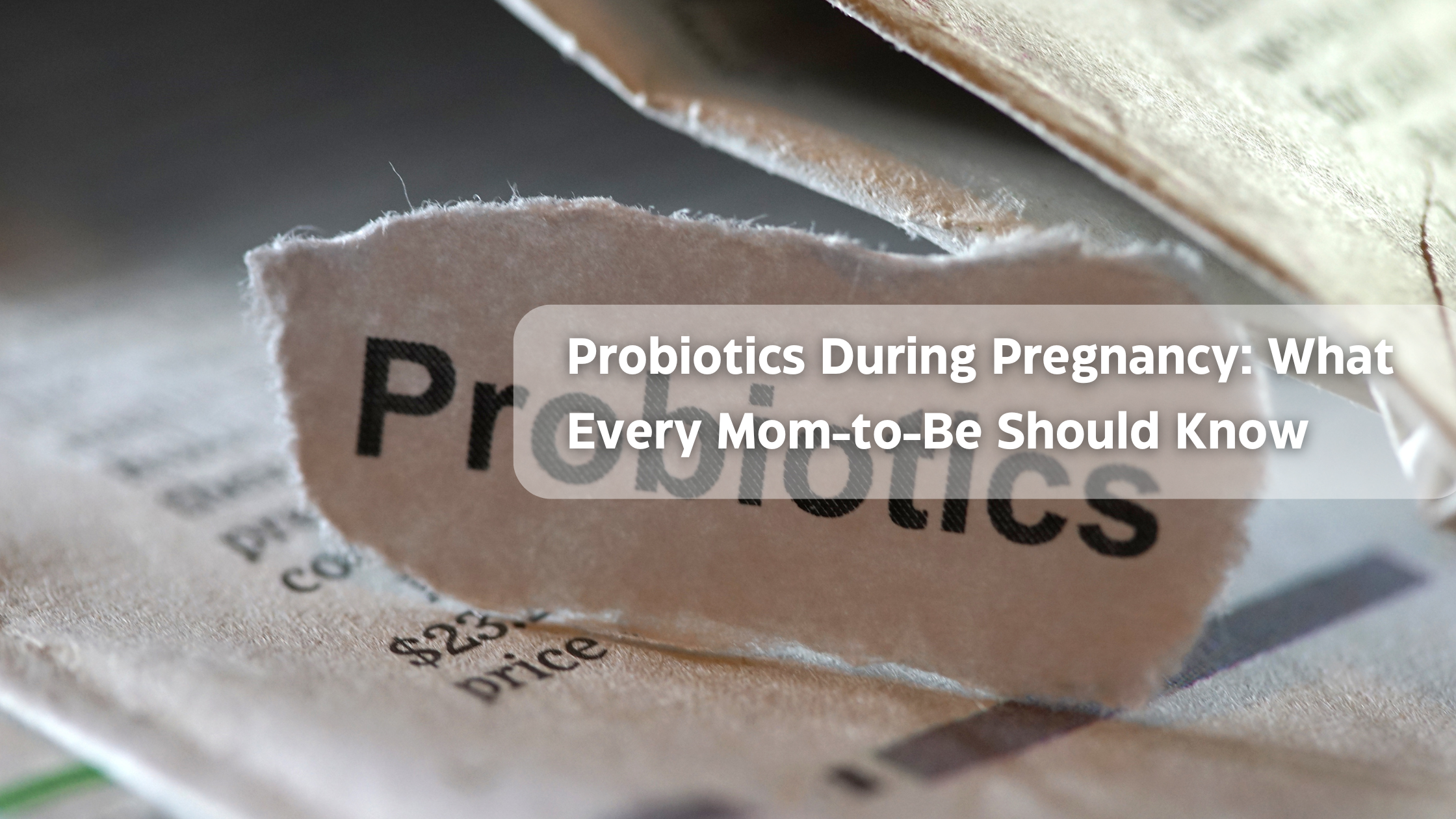Probiotics During Pregnancy: What Every Mom-to-Be Should Know
UNDERSTANDING THE ROLE OF PROBIOTICS IN PREGNANCY

THE IMPORTANCE OF DIGESTIVE HEALTH FOR PREGNANT WOMEN
Digestive health is especially important during pregnancy, as it supports nutrient absorption, strengthens the immune system, and helps manage common issues like bloating and constipation. The hormonal and physical changes that occur can disrupt gut balance, making it essential to maintain a healthy digestive system. Probiotics, which are beneficial live bacteria, play a key role in supporting gut health by encouraging the growth of good bacteria. This not only helps keep digestion smooth but also promotes overall well-being for both the mother and the developing baby.
ARE PROBIOTICS DURING PREGNANCY SAFE?
Many expectant mothers are concerned about the safety of taking probiotics during pregnancy. Fortunately, research shows that probiotics are generally safe and well-tolerated for pregnant women, with no significant adverse effects reported in most studies. However, it's important to consult a healthcare provider before starting any new supplement to ensure it's appropriate for your individual needs. Some probiotic strains have been more thoroughly studied in pregnant populations and are considered safer options. Choosing high-quality, reputable brands is also essential to ensure effectiveness and safety.
HOW PROBIOTICS SUPPORT THE MATERNAL AND CHILD HEALTH
1. Reduce the risk of gestational diabetes
Probiotics may help improve insulin sensitivity and regulate blood sugar levels, potentially lowering the risk of developing gestational diabetes during pregnancy.
2. Lower the chances of preeclampsia
Some studies suggest that probiotics can help reduce inflammation and support vascular health, which may lower the likelihood of preeclampsia a condition marked by high blood pressure and protein in the urine.
3. Ease digestive issues like constipation
Pregnancy hormones often slow down digestion, leading to constipation. Probiotics support gut health by promoting regular bowel movements and improving overall digestive function.
4. Boost immune function
Probiotics help maintain a healthy balance of gut bacteria, which is closely linked to immune health. A strong immune system is essential during pregnancy to protect both mother and baby.

For the developing baby, probiotics may:
1. Support the development of a healthy immune system
Probiotics can help shape the baby’s immune system early on by influencing the mother’s microbiome, which plays a role in the baby’s immune development even before birth.
2. Reduce the risk of allergies and eczema
Research suggests that exposure to beneficial bacteria during pregnancy may help lower the baby’s risk of developing allergies and skin conditions like eczema later in life.
3. Promote healthy gut colonization after birth
Probiotics taken during pregnancy may contribute to the transfer of beneficial bacteria to the baby, especially during vaginal delivery and breastfeeding, helping to establish a balanced gut microbiome from the start.
SELECTING THE RIGHT PROBIOTIC FOR PREGNANCY
Key Features to Look for in a Pregnancy Probiotic
When choosing a probiotic during pregnancy, it's important to consider several key factors to ensure safety and effectiveness. Look for strain specificity probiotic strains that have been clinically studied in pregnant women are more likely to be safe and beneficial. Check the CFU (colony-forming units) count to ensure it provides enough live bacteria. Purity matters too, so choose products free from common allergens and unnecessary additives. Shelf stability is another plus, especially if you prefer a supplement that doesn't require refrigeration. Opt for brands that undergo third-party testing to ensure quality and safety. Lastly, choose a form that fits easily into your routine, whether it's a capsule, powder, or liquid.
The Dosage and Strain Selection for Maximum Safety and Effectiveness
Choosing the right probiotic dosage and strain is essential for both safety and effectiveness during pregnancy. Commonly recommended strains include Lactobacillus rhamnosus GG, Bifidobacterium lactis, and Lactobacillus acidophilus, which have been well-studied for their benefits in expectant mothers. Most research supports a daily dosage of 1 to 10 billion CFUs, though individual needs may vary. Starting with a lower dose and gradually increasing it can help reduce the risk of mild side effects like gas or bloating. It's important to follow the dosage instructions provided on the label or consult your healthcare provider, especially if a higher dose is needed for specific health concerns.
Can You Take Probiotics in First Trimester?
Many women are cautious about taking supplements in the first trimester, and probiotics are no exception. Fortunately, probiotics are generally considered safe throughout all stages of pregnancy, including the first trimester. However, since this early phase is a critical period for fetal development, it’s wise to consult with a healthcare provider before starting any new supplement. Some doctors may advise waiting until the second trimester as a precaution, though this isn’t due to any known risks. If you were already taking probiotics before pregnancy, it's usually safe to continue but always double-check with your doctor for personalized guidance.

PROBIOTICS AND COMMON PREGNANCY CHALLENGES: TIPS AND BEST PRACTICES
Managing Digestive Issues: Probiotics as a Holistic Solution
Many women are cautious about taking supplements in the first trimester, and probiotics are no exception. Fortunately, probiotics are generally considered safe throughout all stages of pregnancy, including the first trimester. However, since this early phase is a critical period for fetal development, it’s wise to consult with a healthcare provider before starting any new supplement. Some doctors may advise waiting until the second trimester as a precaution, though this isn’t due to any known risks. If you were already taking probiotics before pregnancy, it's usually safe to continue but always double-check with your doctor for personalized guidance.
To get the most benefit:
1. Take probiotics consistently
For best results, probiotics should be taken daily as part of your routine. Consistent use helps maintain a stable balance of beneficial bacteria in the gut.
2. Pair them with a healthy, fiber-rich diet
Fiber acts as food for probiotics, helping them grow and thrive. Including plenty of fruits, vegetables, whole grains, and legumes can enhance the effectiveness of your probiotic supplement.
3. Stay hydrated
Drinking enough water supports healthy digestion and helps probiotics function properly in the gut by maintaining a balanced environment.
4. Incorporate fermented foods into your meals
Foods like yogurt, kefir, sauerkraut, and kimchi naturally contain beneficial bacteria and can complement your probiotic intake for added digestive and immune support.
Boosting Immunity: The Link Between Probiotics and Allergies
Benefits of Probiotics During Pregnancy and Early Infancy
1. Lower the risk of eczema in children
Research suggests that probiotic use during pregnancy may help reduce the chances of eczema in infants by influencing early immune development and skin barrier function.
2. Reduce the likelihood of food allergies
Probiotics may help regulate immune responses in the baby, potentially lowering the risk of developing food allergies later in life.
3. Strengthen the baby's developing immune system
By supporting the mother’s gut health, probiotics contribute to a healthy microbiome transfer during birth and breastfeeding, which plays a key role in building the baby’s immune defenses.
Tips to Support Immunity with Probiotics
1. Choose a probiotic with well-studied immune-boosting strains
Look for strains like Lactobacillus rhamnosus GG or Bifidobacterium lactis, which have been researched for their immune-supporting properties in pregnancy.
2. Take the probiotic consistently throughout pregnancy
Daily use ensures a steady presence of beneficial bacteria, which is crucial for ongoing immune support.
3. Continue probiotic use while breastfeeding, if possible
Maintaining probiotics during breastfeeding may help pass on beneficial bacteria through breast milk, supporting the baby’s gut and immune development.
4. Eat a varied diet rich in fruits, vegetables, and whole grains
A nutrient-dense, fiber-rich diet helps nourish both you and your gut bacteria, enhancing the effectiveness of probiotic supplements and supporting immune health.
Vaginal Health: Using Probiotics to Prevent Infections and Discomfort
How Probiotics Support Vaginal Health
1. Maintaining a healthy vaginal pH
Probiotics help keep the vaginal environment slightly acidic, which is important to prevent the overgrowth of harmful bacteria and yeast.
2. Competing with harmful bacteria
Beneficial probiotic strains crowd out harmful microbes by occupying space and consuming nutrients, reducing the risk of infections.
3. Boosting local immunity
Probiotics stimulate the vaginal immune system, helping the body defend against pathogens and maintain overall vaginal health.
Tips to Support Vaginal Health with Probiotics
1. Choose a probiotic with strains specific to vaginal health
Strains like Lactobacillus crispatus and Lactobacillus jensenii are known for supporting vaginal flora balance.
2. Consider both oral and vaginal probiotic supplements
Oral probiotics can benefit gut and vaginal health, while vaginal probiotics deliver targeted support directly to the site.
3. Maintain good hygiene practices
Regular, gentle cleansing helps keep the vaginal area clean without disrupting its natural balance.
4. Wear breathable, cotton underwear
Cotton allows airflow, reducing moisture buildup and lowering the risk of bacterial or yeast infections.
5. Avoid douching or using scented products
These can irritate and disturb the natural vaginal flora, increasing the chance of infections or imbalance.
Probiotics can be especially helpful in preventing and managing conditions like bacterial vaginosis and yeast infections. These are common during pregnancy and can lead to complications if left untreated. Always consult your healthcare provider if you experience any unusual symptoms. They can guide you on the best treatment approach, which may include probiotic supplementation.

